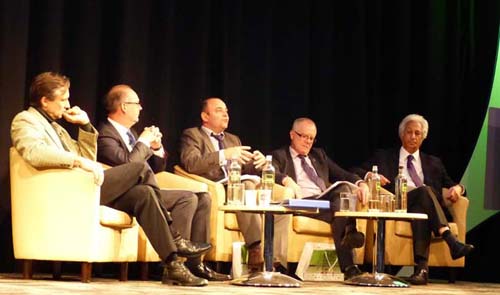The support for longer term arrangements came in a debate at last week’s LARAC conference in Nottingham which looked at the rationale for long term contracts in light of the PAC concern. The topic was raised in a panel discussion run by LARAC chair Andrew Bird.

Mr Bird asked the panel whether the PAC was right to query long-term deals.
Responding, Gev Eduljee, external affairs director at waste management firm SITA UK, argued that it was important to have facilities amortised over 25 years to keep council tax charges in check. But, while reasoning that a facility typically lasted 25 years, he said: “what is really needed is flexibility in the contracts”.
Robert Hunt, contractor Veolia’s executive director for business development, said that “letting PFI contracts for 25 years has meant affordability in the early years. And, on some of our PFI contracts we have to hand them back with five years life still left in them. I would say that waste PFIs have delivered what they have said on the tin.”
His comments were endorsed by Bill Griffiths, national organics and recycling manager at waste and recycling firm Viridor, who said that the industry over the last 10 years has “been able to quadruple the recycling rate through investing in infrastructure, steel and concrete and communications. We need the longer term contracts to get the social and financial payback.”
Future
However, taking a more cautious approach, Dr Dominic Hogg, chairman of consultants Eunomia, said that he had “some sympathy with the Public Accounts Committee, it is difficult to predict what might happen in 25 years.
“We have seen recycling rates increase well beyond what we saw were challenging rates just a short time ago. There are also different profiles of waste coming forward so I think it is difficult to specify contracts for that period of time. Amortisation has happened but the things that the investment is for may not be at the top of the hierarchy and not what we should have been investing in.”
Dr Eduljee pointed out that local authorities themselves are also involved in long term contracts. “Take Coventry and North London, these are publicly owned and they can do what they want for as long as they want. Size is important, you have to get it right. Our incinerators are predicated on 55% recycling and are sized on the residual tonnages. I think we have by and large got it right in this country.”
Dr Hogg queried the recycling targets which can be used when planning infrastructure, questioning whether when looking forward 50% would be enough? “Do we want to be at 50% in 2040?”
“Partnership working,” emphasised Mr Griffiths of Virdior, “is really important. If you have a good long term working partnership between the contractor and the local authority you can be ahead of the curve.”
And, in terms of PFI projects from which Defra has pulled financing at short notice, several members of the panel reasoned that the calculations behind the need for the projects were valid. Dr Eduljee noted that two of the projects had still gone ahead and Mr Hunt said that “it would have made sense for the process to continue as it would have been a quicker way to deliver environmental benefits”.











Subscribe for free